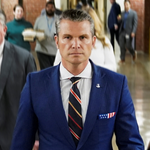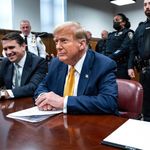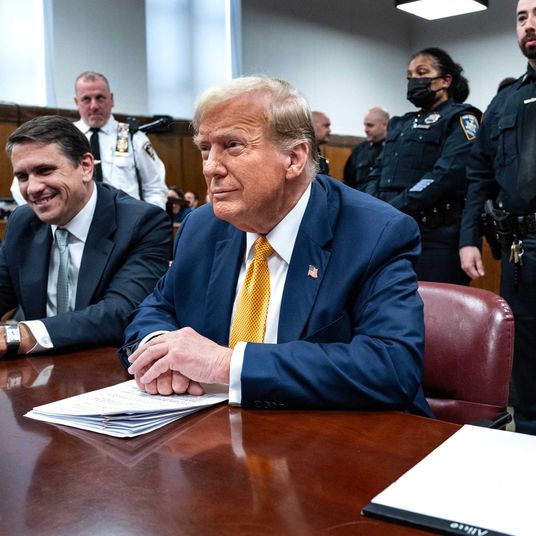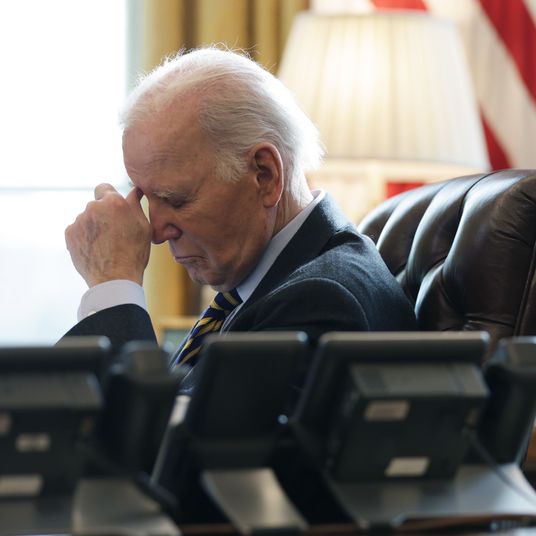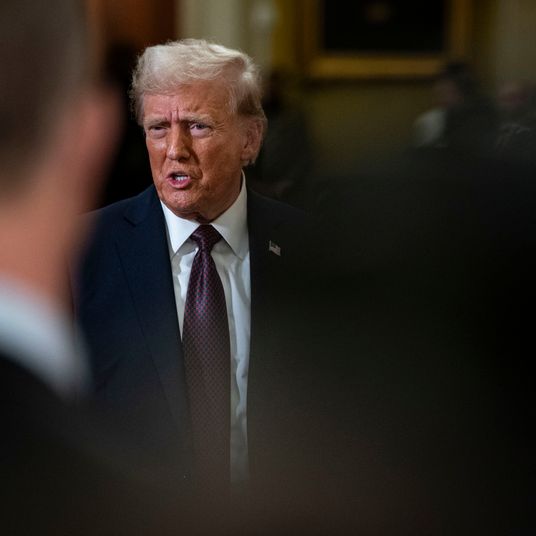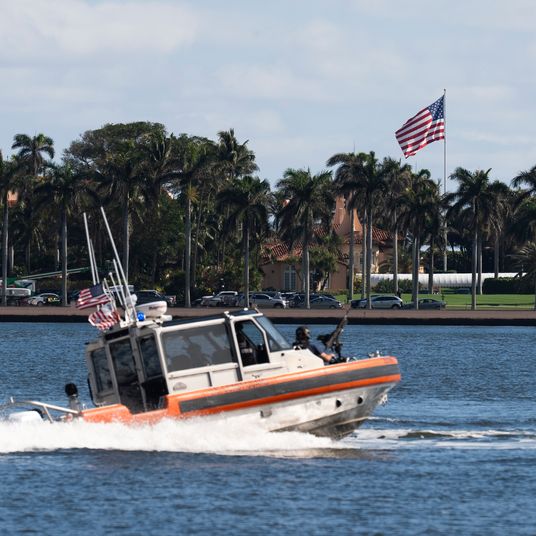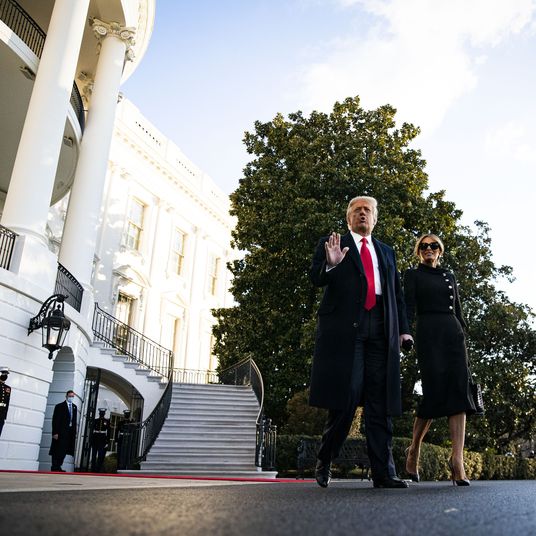
Obama in Berlin.Photo: Carsten Koall/Getty Image News
With all the wailing and gnashing going on today in the political world over that incendiary Gallup poll — the one conducted for USA Today that shows John McCain ahead of Barack Obama by four points among likely voters — it would be easy to overlook another bit of research released this morning by the hardest-working numbers-crunchers in the business. This particular poll appears on Gallup’s Website under the headline “Assessing the Impact of Obama’s Trip.” The trip in question, of course, would be the Audacity of Hope World Tour; the impact in question, of course, would be on the presidential race. According to Gallup, 35 percent of voters have either a positive or very positive opinion of the trip, 26 percent have a negative or very negative opinion, and 39 percent “don’t know enough to say.”
The size of the last group will no doubt come as a surprise to pundits who spent so much time last week — and still! — holding forth about the political impact that Obama’s whirlwind jaunt was certain to have. (God knows that an absence of information has never rendered them opinionless.) The initial reaction to the trip was as fawning as it was banal: Gosh, he looked so presidential! Golly, he was gaffe-free! And hey, didja see that three-pointer? Talk about a man of destiny! Then came the inevitable backlash: Presumptuous! Arrogant! Ego-tripping! Talk about a hot dog!
The truth of the matter is that, at this stage, none of us can know what the lasting implications of Obama’s foreign whistle-stop will be. The images of him in the Middle East certainly struck me as giving him gravitas. (And the Maliki endorsement of his troop-withdrawal timetable was a ginormous political gift.) The images of Obama in Berlin, by contrast, may be effectively used against him. (See this early, and kinda funny, effort from the Republican National Committee.) But the nature of the trip — which will either work or not on an unconscious level, either assuaging inchoate doubts about Obama or exacerbating them — won’t be known until Election Day, if ever.
But that doesn’t mean Obama’s trip wasn’t instructive or clarifying — about both him and his campaign. In fact, I can think of five things that Obama’s odyssey brought into focus.
1. The Obama campaign has some stones.
In certain quarters, it’s becoming conventional wisdom that the Obama campaign is playing it too safe, that it’s too controlled and too controlling. And though there may be something to the criticism in general, the world tour suggested that when Obama’s people perceive the potential payoff to be high, they are willing to roll the dice. A trip of this kind is risky business, fraught with peril — the kind of gambit few politicians without the resources, diplomatic infrastructure, and security apparatus of the White House behind them would’ve had the nerve even to contemplate. Which brings us to …
2. The Obama campaign scales — but isn’t perfect.
The organizational prowess displayed during the Democratic-nomination fight by the guys and gals in Chicago is already the stuff of legend, and justifiably so. But Obama’s international trip was in a different league from anything his squad had attempted before: an undertaking of gargantuan logistical complexity and political sensitivity. Yet the Obamans pulled it off in a sweat-free style reminiscent of their candidate’s recent forays to the gym. For Democrats concerned that Team Obama might lack sufficient general-election experience to take its game to the next level, last week should have provided ample reassurance. At the same time, though, the decision not to visit the troops hospitalized in Landstuhl, Germany, was clearly a bonehead move — one which suggests that, for all their savvy, the Obamans still don’t fully grasp the nature (and the resonance) of the attacks that McCain and his people plan to build their campaign around.
3. On foreign policy, Obama = Bush.
Okay, that’s an overstatement designed to be provocative, but it’s not a million miles from the truth — and, counterintuitively, it’s also not such a bad thing, at least politically speaking. What the Middle East portion of Obama’s trip highlighted is that on Iraq, Iran, Pakistan, Afghanistan, and Israel, his positions all fit quite comfortably into what the Council on Foreign Relation’s Walter Russell Mead calls “a loose bipartisan consensus” now emerging on policy toward the region — a consensus, Mead argues, that’s “closer to Bush’s views than to those of the antiwar activists who propelled [Obama] to [his party’s] nomination.” A painful thought for some on the left, to be sure. But a fact that robs McCain of a potentially powerful point of contrast.
4. Even so, Obama is vulnerable on the surge.
It’s now taken as read that on a central question of military policy viz the central foreign entanglement of our time (and also one of the central political issues of the election), McCain was right and Obama was wrong. Unlike the war itself, this is an issue where Obama actually had to cast a vote in the Senate. With McCain driving the media narrative, Obama was asked repeatedly on the trip to recant his original position. His answers weren’t merely poor and grudging, but veered into the realm of falsehood when he suggested in interviews that he’d always believed the surge would reduce the mayhem in Iraq. In fact, he said at the time of its announcement, “I am not persuaded that 20,000 additional troops in Iraq is going to solve the sectarian violence there. In fact, I think it will do the reverse.” This is a question that Obama is going to be peppered with again and again, and he needs a better reply. The argument that judgment trumps experience in foreign policy worked in the Democratic primary, when the debate was over the authorization of the war itself. But now the debate is going to be more forward-looking, and McCain can claim his judgment on the surge as a means of bringing a measure of peace and stability to Iraq trumped Obama’s.
5. Obama is in McCain’s head — Obama needs to get McCain a little bit in his.
As I argued recently in the magazine, McCain’s annoyance with what he sees as the infatuation of the press with The One, as his campaign has dubbed Obama, has reached Hillary Clinton–esque proportions. His envy of Obama’s rock-star status is acute as well, and made all the more searing by the fact that he views his opponent as a lightweight, a line-cutter, a hypocrite, and a phony. But Obama’s voyage and the adulation it received seemed to push McCain over the edge and his campaign into a harshly negative new mode. Obama’s responses have been far from the kind of bare-knuckled rejoinders that some Democrats would like to see. (While abroad, he said he was “disappointed” that McCain had accused him of being willing to “lose a war in order to win a political campaign.”) Is it possible that McCain’s sheer awfulness as a candidate and the wanton ineptness of his operation has lulled Obama into thinking he’s got this thing in the bag? Fearful Democrats worry that it has. And they hope that his bounceless return from abroad will steel his spine for the war at home. —John Heilemann
Related: Republicans Awkardly Attempt Internet Humor [NYM]
McCain’s Hillary Problem [NYM]
Lukewarm Reactions to Favored Obama Veep Candidate [NYM]
For a complete and regularly updated guide to presidential candidates Barack Obama and John McCain — from First Love to Most Embarrassing Gaffe — read the 2008 Electopedia.



